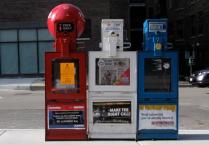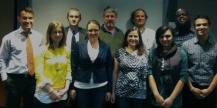 |
Mass Violence and the Media in AmericaI was watching, and occasionally engaging in the social media conversation the weekend following the Boston Marathon bombings and was struck by the extent to which we as a collective were seeking clarity on the meaning of the events, and needed to know the motive in order to make sense of the bombings. One particular exchange focused on whether this event was in the category of Columbine or of Oklahoma City. My initial response was that this event was Columbine with explosives, and I received quite impassioned responses that no, this was a terrorist event, and I was conscious that the labeling of the event mattered quite a lot. This shouldn’t surprise any of us; the label attached to violence has been part of the struggle throughout the history of terrorism. One poignant example is the ten IRA prisoners who died in 1982 in a hunger strike... |
 |
I Will, I Can, I AmLouisville, Kentucky is home to the Muhammad Ali Center, a place that promotes the principles of “confidence, conviction, dedication, giving, respect, and spirituality.” As a scholar-athlete studying Sport Diplomacy, I was excited to have been recently invited to speak at the Center’s forum on “Athletes for Social Change” regarding the role that educational institutions can play in supporting athletes working to create positive social change. The venue stands as a representation of Muhammad Ali’s example that athletes can be athletic, social, and political forces. Other athletes have followed in Ali’s... |
 |
A New Yearlong Course: The Political Economy of Civil War and Peacebuilding
One challenge of graduate school is building long-lasting relationships with faculty members. In the hustle and bustle of the typical semester, it can be difficult to build the kind of mentorship that many graduate students–and faculty members–desire. This year, Professor Terrence Lyons and I built a new solution to this dilemma by offering an innovative, yearlong, and team-taught course focusing on the political economy of civil war and peacebuilding. MS students Lindsay Burr, Barre Hussen, Dilafruz Khonikboyeva, Beth Rivard, Van Schmidt, David Younes, and Alvaro Zarco teamed up with PhD students Charles Martin... |
 |
The Discourse of Storytelling
The Center for the Study of Narrative and Conflict Resolution (CNCR) focuses on the establishment of relational dynamics through the discourse of storytelling. Conflicts stem from the search for validity and justice. The practice of exchanging narratives allows individuals to disclose struggle and emotion experienced from shared histories while gaining a counter-perspective of the Other. CNCR’s mission is to anchor research in narrative processes in conflict dynamics within and across the faculty and students at S-CAR, thereby advancing narrative theory and practice. Dr. Sara Cobb, the director of CNCR, is currently teaching CONF 695: Narrative... |
|
|
Experiential Learning at S-CAROn December 5, 2012, the Undergraduate Experiential Learning Project (UELP) in collaboration with the Applied Practice and Theory (APT) course on Experiential Learning hosted a workshop and discussion on topics surrounding experiential learning in the classroom. The workshop began with an activity designed to get practitioners talking about themselves and their experiences with experiential learning activities in their classrooms. After breaking the ice, the participants gathered for an informational presentation on the goals, achievements, and future of the project, led by S-CAR professors Dr. Susan Hirsch and Dr. Agnieszka Paczynska. Graduate Research Assistants who are working on the project also provided their insight and offered their assistance as points of contact for specific experiential learning activities (ELAs) that are being used in the... |
 |
S-CAR in April: Reasons to CelebrateOn April 20, 2013, S-CAR community members came together to celebrate the Thirty Year Anniversary of the School, a milestone in the institution’s “journey from the modest trailer in Fairfax in which it began to the junction of knowledge and policy,” as Dean Bartoli would say. Thirty years after George Mason University supported the inception of an innovative postgraduate degree, a Master of Science in Conflict Resolution, S-CAR finds itself expanding its sphere of influence and impact with a full range of degrees in addition to the MS, boasting graduates of the BS, BA, PhD, and graduate certificate programs. Alumni, professors, and current... |
 |
Nino Kukhianidze, S-CAR Masters StudentNino Kukhianidze, a final year MS student at S-CAR, is currently working to develop an initiative to promote post-conflict development through the arts. While there have been other similar initiatives such as the Dance for Peace or the Theatre for Peace projects, Nino is looking to add “smart peacebuilding” elements to her design. Nino asserts that smart peacebuilding is “developing a comprehensive program that would prove to be both sustainable and durable for the community that it is targeting.” This would involve identifying a part of the arts that the targeted communities largely engage in... |
 |
Innocent Rugaragu, S-CAR PhD StudentInnocent Rugaragu is a PhD student at S-CAR. He is also an ordained Jesuit Catholic Priest. Originally from Rwanda, Innocent said, “I watched in horror as the genocide was taking place and that was when I decided that I must devote my life to fight for social change, peace, and justice.” Still reeling from the memory of the genocide, he feels that the priesthood provided him with the emotional and spiritual strength to pursue a path that called for “understanding, promoting, respecting human life, human dignity and human values rather than objectifying them.” Innocent’s journey... |



